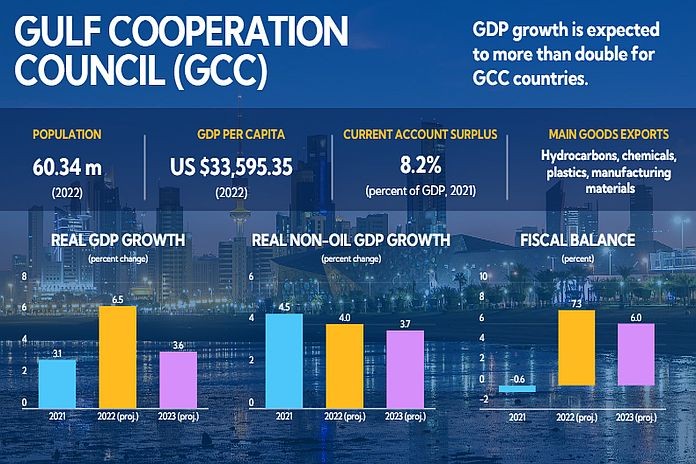-
-
- Additional revenues from higher energy prices could help the region achieve long-term prosperity by maintaining the recent reform momentum
-
IMF Country Focus
By Amine Mati and Jerome Vacher
GDP growth for Gulf Cooperation Council (GCC) countries – Bahrain, Kuwait, Oman, Qatar, Saudi Arabia, and the UAE is expected to more than double, reaching 6.5 percent in 2022, according to our recent Policy Paper. Surging commodity prices have limited the spillovers from the war in Ukraine and the impact from tighter global financial conditions, and have allowed for a more positive outlook for GCC economies.
Throughout its history, the GCC region has experienced distinct periods of rising oil revenues. During those periods, countries deepened their dependency on oil and gas, increased wages and hirings in the public sector, expanded social safety nets, and ramped up capital expenditure. During 2002-08 and 2010-14 for example, the public sector wage bill increased by 51 and 40 percent respectively.
Our analysis suggests that GCC countries will save far more resources than during previous episodes because of the fiscal and structural reforms taken in the region. In 2022 alone, the overall fiscal surplus will amount to over $100 billion, as the rise in expenditures, particularly on wages, remains contained so far.
While GCC countries have benefited from higher, albeit volatile, oil and gas prices, numerous risks still cloud the outlook notably a slowdown in the global economy. In this context, the reform momentum established in previous years should be maintained irrespective of the level of hydrocarbon prices.
How to keep that reform momentum
To respond to near-term shocks and firmly address medium-and long-term challenges, we recommend implementing a comprehensive package of policies that includes:
- Using additional revenues from higher oil prices to rebuild buffers and strengthen policy space. Given the available fiscal space, targeted support for the most vulnerable can be prioritized, leveraging the progress made on digitalization.
- Keeping medium-term fiscal policy geared towards ensuring fiscal sustainability and increasing savings, through a credible fiscal framework. Over the long term, this is critical to ensure equity between generations and a smooth energy transition out of fossil fuels. This can be supported through non-oil revenue mobilization and energy subsidy phase-out, which will also contribute to climate change mitigation. Other supporting measures include the gradual reduction of public sector wage bills and increasing spending efficiency – for example, through continuing reforms to improve procurement and investment planning. A proper assessment of the fiscal stance will require fully incorporating the sovereign wealth funds’ operations, given their role in diversifying savings from oil revenues and their involvement in national development strategies.
- Maintaining financial sector stability, which is essential to sustaining strong economic growth. As a result of high oil prices and abundant liquidity, which are facilitating credit expansion, GCC bank balance sheets are currently shielded from tighter global financial conditions. However, bank soundness should continue to be carefully monitored.
- Accelerating ongoing structural reforms, including by raising female labor force participation, increasing flexibility for expatriate workers, improving education quality, further leveraging technology and digitalization, enhancing regulatory frameworks, strengthening institutions and governance, deepening regional integration, and addressing climate change adaptation and mitigation challenges. Implementing policies for sustained private sector-led economic growth and diversification will be as key as ever.
Amine Mati is an Assistant Director and Jerome Vacher is a Senior Economist. Both are in the IMF’s Middle East and Central Asia Department.






